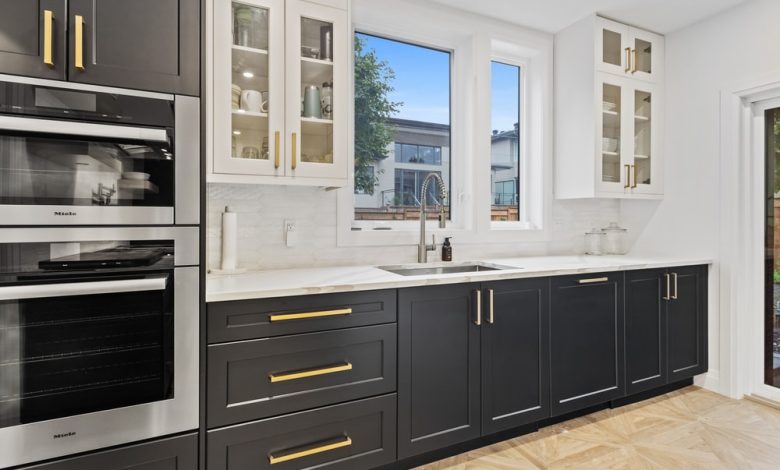9 Easy Steps to Measuring Your Kitchen Cabinet

When it comes to kitchen remodeling, taking the right measurements for your cabinets is one of the most important things to do. This makes the ordering and installation easy.
When you are up to remodel your kitchen’s look and feel, you might want to revamp your kitchen cabinets. It is important to know how to measure your cabinets in the right way. This is an essential skill to have when you want to make your kitchen’s appearance aesthetically pleasing and functionality to the next level.
Measuring your cabinets for your kitchen can be done without having to immediately remove the cabinets. With some easy steps, you can measure the wall dimensions in minutes. However, for your convenience, here are some stepwise instructions on how to measure your cabinets to get a personalized design and assessment.
Table of content
- Take the right tools
- Make a rough sketch
- Measure your space
- Take horizontal and vertical measurements
- Measure doors and windows
- Measure the placement of appliances
- Note the location of fixtures
- Some quick tips for accurate measurements
- Choose the right kitchen cabinets
-
Take the right tools
Taking the measurements for a cabinet is not difficult anymore. In order to take measurements for new cabinets, the following items are needed:
- Tape measure
- Pencil
- Planning grid/scratch paper
- Calculator
- Step stool or ladder
- Level ruler
-
Make a rough sketch
You can draw a layout of your kitchen by circling the walls and marking their locations. Also, mark where any windows or doorways are in your kitchen and label them. A rough sketch will help you understand if you are looking to change your desired cabinet layout.
-
Measure your space
Take your measuring tape and measure windows and doorways from outer trim to outer trim. During the measurements, mark whether an area has upper cabinets or lower cabinets (or both).
-
Take horizontal and vertical measurements
To take the measurements accurately, make sure to take both the horizontal and vertical measurements. Take the measurement from wall edge to wall edge in order to get the total space. The vertical distances from the floor to the ceiling at each corner and the middle of each wall should be noted on the rough sketch.
-
Measure doors and windows
Measure the doors and windows with their proper height and width. Usually, the size of doors and the width can vary in every size. Windows come in a variety of sizes, especially depending on the age of your kitchen.
-
Measure the placement of appliances
Your measured layouts should also show the placements of any appliances or fixtures that will not be/cannot be moved. This may include a gas stove or an existing kitchen island.
-
Note the location of fixtures
Measuring and marking out all electrical, plumbing, and vents is equally important. They can all be driven to fit your remodeled layout during the construction phase.
Choose different upper and lower cabinet colors. Opt for a lighter color on the upper cabinets and a darker color on the lower cabinets. This can make the room appear larger and adds visual interest.
Keep it in the same color family. Colors come in a variety of shades, tones and tints. Use different shades of the same color to create a cohesive look throughout your cabinetry. Good color options include shades of gray, blue, and brown.
Play with wood stains. Achieve a subtle look by choosing different wood stain colors for the cabinets in your kitchen. A natural color keeps things light and airy while a dark look can highlight a section of cabinets.
Go with glass. While not actually a color, you can achieve a bright look in your kitchen by adding glass-front cabinets. For a pop of color add wallpaper to the back of the cabinet or paint the back to match your room’s décor. You could also simply fill your cabinets with colorful display pieces. This provides a distinct contrast from your full-paneled cabinetry.
-
Some quick tips for accurate measurements
With all of the detailed processes for the right measurement of your cabinets, there are certain things to consider that have a great impact on the kitchen layout and cabinet building. The following things can help you coordinate the right results of the kitchen’s layout:
- The work surface should be well-illuminated by appropriate task lighting.
- Pay attention to the cabinet height and plan to store frequently used items within easy reach.
- A work triangle is a must consider. It is the distances between the three work centers—sink, cooktop, and refrigerator—that form a work triangle.
- Fridge Landing Area – For easy handling of cold-storage items include at least 15 inches of the countertop landing area to one side of the refrigerator or within 48 inches of the refrigerator front.
- Consider the sink landing area for efficient prep and cleanup.
- Include waste receptacles near the sink and for recycling.
- Locate the dishwasher within at least 36 inches of the sink.
- The oven landing area must include at least a 15-inch next to or above the oven for easy loading and unloading of items when baking.
- Consider the width of a work aisle that should be at least 42 inches for one cook.
- The cooking surface landing area
-
Choose the right kitchen cabinets
Once you have recorded all the measurements, the next step is to narrow down the cabinets that are the best fit for your kitchen. Choosing from the various choices of cabinets might become overwhelming. However, the configuration of your kitchen cabinets Collections depends on the layout design that is defined by the right measurements.
Conclusion
Proper measurements are essential when designing your dream kitchen from scratch or renovating an existing one. Certainly, the dimensions of cabinets may vary from 9” to as wide as 60”. However, it depends on the purpose of the unit. By obtaining the most precise measurements, you will be able to identify exactly what appliances will fit in the space and where to place them efficiently.
Author bio:
Hi! I’m Dean, a content writer with 2 years of experience. I write SEO articles, website content, blog posts, guest posts, and copy writings for businesses that want to see their Google search rankings surge. I also have extensive experience with content marketing. Until now, I have completed a number of projects ranked on Google’s first page in this field.




